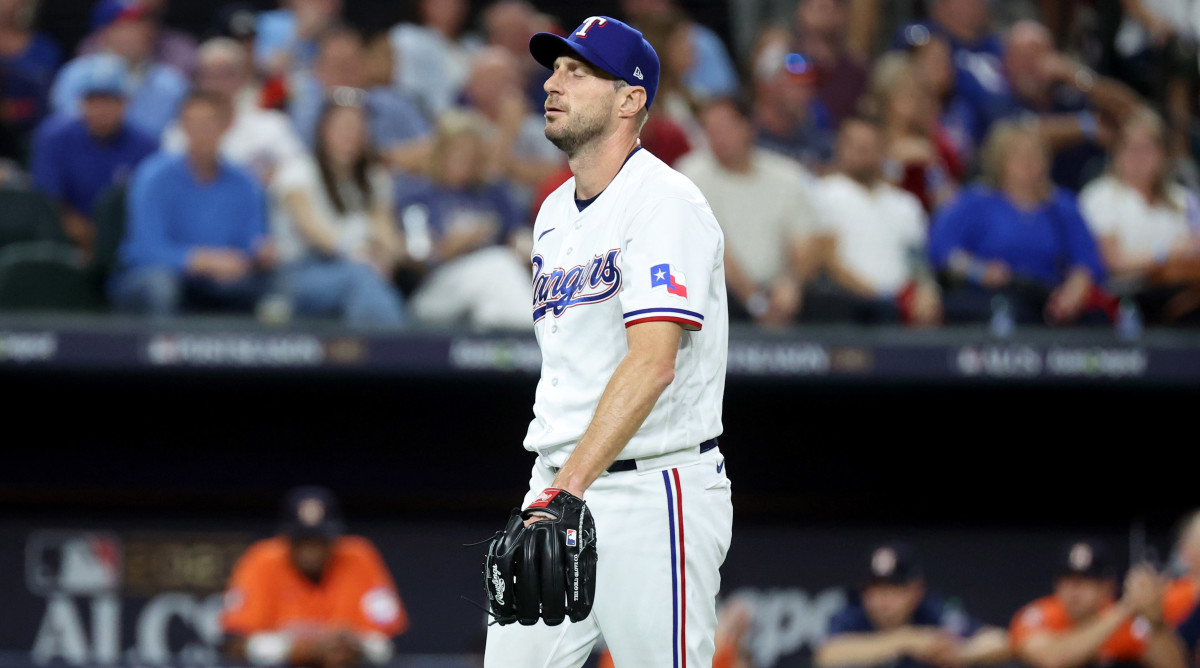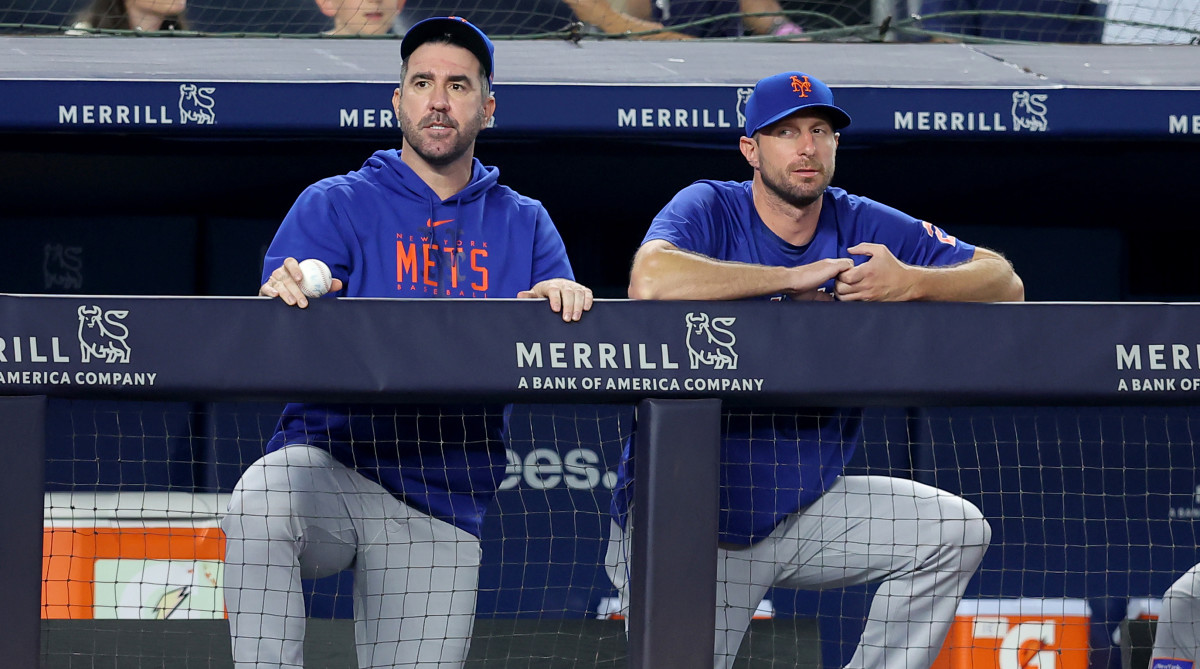Rangers’ Risky Bet on a Rusty Max Scherzer Opens the Door to Astros in ALCS

He is the last of a breed, a pitcher who still logs distance runs to enable him the mental and physical strength to keep his stuff deep into games (even if out of respect for the Texas heat, his runs often come inside Globe Life Field with the roof closed). Since he turned 35, he has shamed much younger pitchers by gobbling up more innings than anyone except Gerrit Cole. He is the only pitcher since 1884 to last 2,800 innings and maintain a strikeout-to-walk rate of 4.5.
Rangers righthander Max Scherzer may have the heart of a marathoner and the will of an ox, but when he took the ball for ALCS Game 3 on Wednesday, it proved to be too big of an ask even for him. The ask: Face the best road hitting lineup at age 39 after not pitching for 36 days because of an arm injury.
It went about as should be expected. His stuff was good but a bit short, especially his slider and his command, which were too wobbly to overcome key mistakes. When Texas manager Bruce Bochy removed him after four innings, down 5–0, not even the willful righthander could mount an argument.
“I still felt like I had stuff in the tank, but I understand the direction they wanted,” Scherzer said. “Given where the score was, and how the game was going, I get why they pulled me. I 100% agree with it. But for me, I know I still had stuff left in the tank, so I’m not worried about my arm moving forward.”
The start by Scherzer brought the Astros, though still down two games to one, back into the series with momentum. Kyle Tucker and Jose Altuve found their strokes. Yordan Alvarez is an opposing manager’s nightmare because he continues to wear out any pitcher and any pitch Texas throws at him. And if this series goes to a Game 7, Houston has the pitching matchup edge with Cristian Javier and his now-you-see-it-now-you-don’t fastball over a rusty Scherzer.
Back at the end of July, as the Rangers checked with all 29 other clubs with the usual trade deadline calls, Mets GM Billy Eppler alerted Rangers GM Chris Young that New York was putting Justin Verlander and Max Scherzer into play. Young quickly convened a meeting of his top analysts and advisers. They crunched all the numbers and studied the contracts. Which pitcher did they want? The Rangers chose to make a run at Scherzer rather than Verlander.

The decision involved contract length. Verlander had a vesting option that would kick in for 2025 if he threw 140 innings next year. Scherzer had no financial commitment behind ’24.
But the decision also involved making a call on who had the better stuff. Verlander (6–5, 3.15 ERA) had the better surface stats over Scherzer (9–4, 4.01 ERA), but Scherzer had the better underlying stats, such as strikeout rate (10.1–7.7). The underlying metrics on stuff pushed Texas to choose Scherzer over Verlander.
Now each has a loss in this ALCS, with the two warriors trying to maximize what they get out of their stuff at this age. In Scherzer’s case, his stuff could not overcome all the rust from missing five weeks due to a strained muscle underneath his right armpit, an injury which first presented as tightness in his forearm.
A prime Scherzer could survive making mistakes in the zone; not a Scherzer at 39 with one simulated game thrown in the previous five weeks. He forced himself to be content with consolation prizes: that he came out of the start healthy, he wasn’t fatigued when he was lifted and he did have good velocity. His autopsy of the defeat hinted at the lowered expectations.
“I mean, you know, I’m not going to sit here and beat myself down,” he said. “I still thought I did some good things and made some good pitches and, you know, I’ve got to focus on that and move that forward.”
Truth is, he did not have a good slider. The movement on his fastball, slider and curveball were all down. Worst of all, in big moments, when Scherzer needed to make a pitch, his command betrayed him.
In the second inning alone, he hit Alvarez in the back foot with a pulled cutter, walked Tucker on a bounced changeup that wasn’t close, left an 0–1 slider to Mauricio Dubón over the center of the plate (single) and left a 1–1 fastball up to Martín Maldonado (two-run single).
The missed locations kept adding up. A fastball up to Altuve became a home run (though, truthfully, the pitch was well above the strike zone and was more the result of Altuve’s sword-like bat control). A hanging slider to José Abreu became a double. A full-count middle-middle fastball to Dubón became a single.
“Obviously, I’m not happy with the Abreu hanging slider and the [slider] to Dubón,” Scherzer said. “Those are the only two that I really have beaten myself up over.”
What about the dagger of a single by Maldonado? Scherzer threw an in-zone fastball the next pitch after bouncing a slider for a run-scoring wild pitch.
“That’s an execution thing,” Scherzer said. “There’s some underlying crap that’s going on there, with that specific one. I thought if I got it up in the zone enough, I could maybe pop him up, but I didn’t. It’s just off, you know? You can second-guess the pitch call. That’s fine.
“You might be able to isolate a few pitches here and there in terms of execution. But, in general, I thought I located the ball pretty well for a layoff. But this is the postseason. There’s no excuses. You either win or you lose, and tonight we lost.”
Meanwhile, Alvarez continues to haunt how Texas pitchers navigate the lineup. “Right now,” said Houston third baseman Alex Bregman, “he might be the best hitter I’ve ever seen.”
Bregman knew Alvarez was special from his very first game. It was 2019. In his second at bat, Alvarez smashed a three-run homer off Dylan Bundy.
“First day in the big leagues, all of us just sit on fastball and just try not to get embarrassed,” Bregman says. “He hits a 1–0 changeup out against [Dylan] Bundy, and I go, ‘How did you do that?’ And he goes, ‘I was sitting on changeup.’ I mean, first day in the bigs and you’re sitting on changeup?
“We all look for pitches from time to time. The difference with him is that he’s almost always right. It’s like he has special powers.”
Alvarez had two more hits and was robbed of a home run by a spectacular snatch-it-back catch by Texas center fielder Leody Taveras. But it was a two-run single off Will Smith that spoke to the difficulty of game-planning against Alvarez. The at bat began with Alvarez swinging through a middle-middle 92-mph fastball. Hmm. Texas catcher Jonah Heim took note.
“We kind of knew he was sitting on slider there,” Heim said about that swing. “And that’s Will’s best pitch.”
The count went to 2–2 on three fastballs and a noncompetitive slider. What do to next?
“We could have went slider,” Heim said, but he and Smith guessed Alvarez was still sitting on slider—which he was. But so strong is Alvarez that he somehow adjusted and shoveled the pitch into center field for the two-run single.
“I mean, we can play Monday morning quarterback all we want, but, I mean, he didn’t hit it hard,” Heim said. “We made a good pitch.”
The challenge facing Alvarez is not just that he is so balanced with his body and quick with his bat (the next time you see him out on his front foot will be the first), but also that he intimidates game-callers because he is the best hitter at sitting on a pitch since Manny Ramírez.
“You can kind of feel what he’s trying to do,” Heim said about trying to out-think Alvarez.
One of these days this postseason is going to give us a gem of a game, besides the one comeback win by Atlanta over Philadelphia in the NLDS. Teams are 19–7 this postseason when they score first, a .731 winning percentage that is way up from the .665 mark in the regular season. This wasn’t it, and it was mostly because Scherzer rattled and creaked his way through four innings in which he gave up five runs.
“Look, I made some mistakes; I get it,” he said. “You know, I got punished for it, but there were some good things I also did as well. So, you know, it’s tough to take a loss in the postseason any time.”

Scherzer has made 23 starts in the postseason. His teams are 9–14 in those games. His career postseason ERA is 3.80, well above his regular-season ERA of 3.24. But this dud needs to be separated from the others because of the circumstances. Scherzer essentially was making a rehab start in the middle of the ALCS.
No team gave the ball in the postseason to a pitcher who had been out so long since the Rockies did it with Aaron Cook in the 2007 World Series. Cook had not pitched for the Rockies since Aug. 10 due to a strained muscle in his side. When he began a minor league rehab Sept. 1, he reaggravated the injury. Just before the World Series, Cook faced 16 hitters in a sim game. The Rockies put him on the roster and gave him the ball on 69 days of rest as a starter in Game 4. He gave up three runs in six innings and lost what was Boston’s clinching win, 4–3.
For Scherzer, he might get another chance. The Rangers won’t turn away from Scherzer if there is a Game 7. Despite the rust, they still trust the pedigree. He’s healthy, if not fully sharp, so you give the ball to one of the great pitchers of this generation.
Meanwhile, Verlander, 40, who could not get a swing-and-miss at 47 fastballs in his Game 1 loss, gets his mulligan in Game 5, which is either an elimination game for Houston or a swing game.
Former teammates with the Tigers and Mets, with 34 seasons, 471 wins and six Cy Young Awards between them, Verlander and Scherzer loom as pivotal characters in this series. Each is 0–1 in this series and may get the ball again. It’s like the trade deadline all over again. Verlander or Scherzer? Scherzer or Verlander? Who do you like? The AL pennant may ride on that answer.
